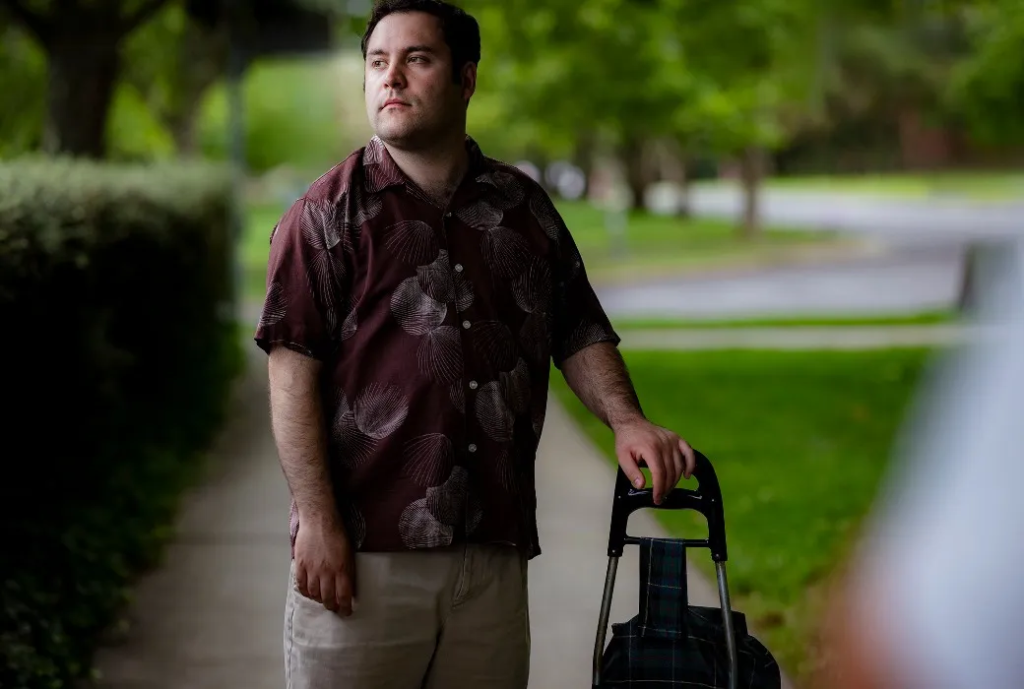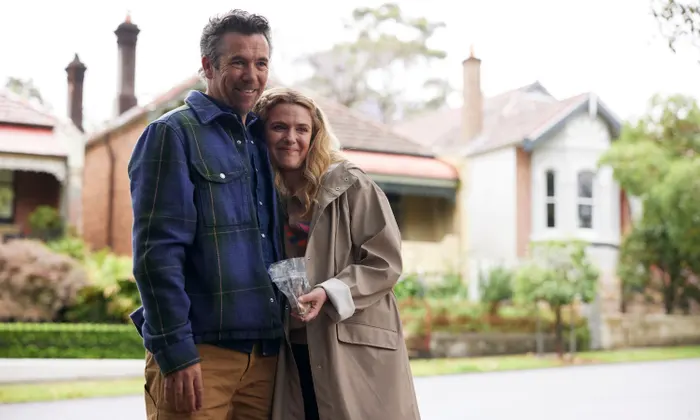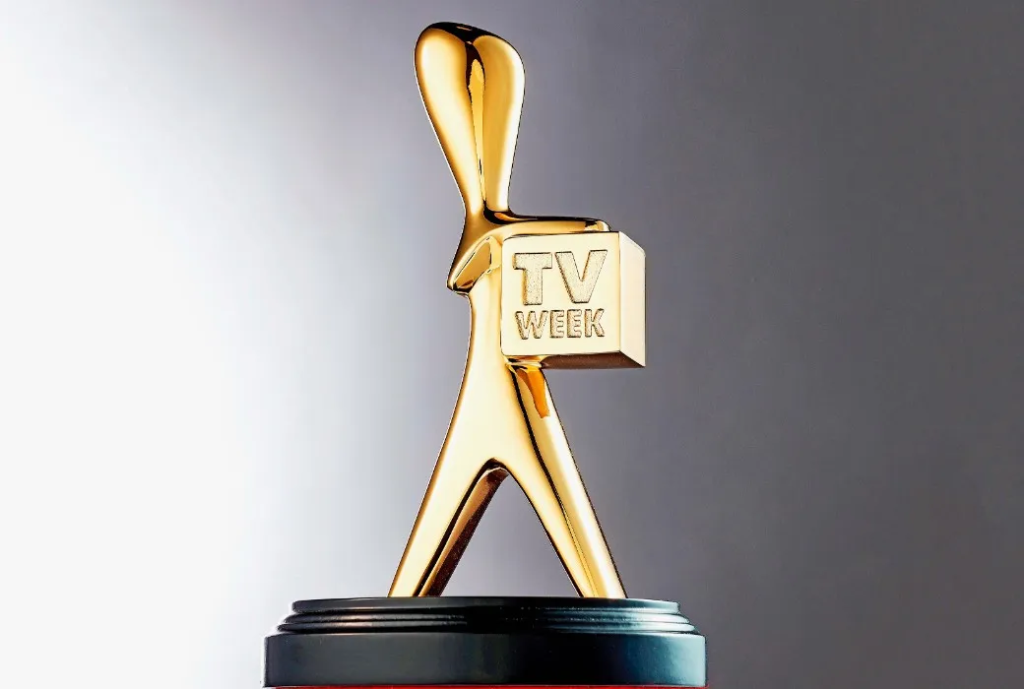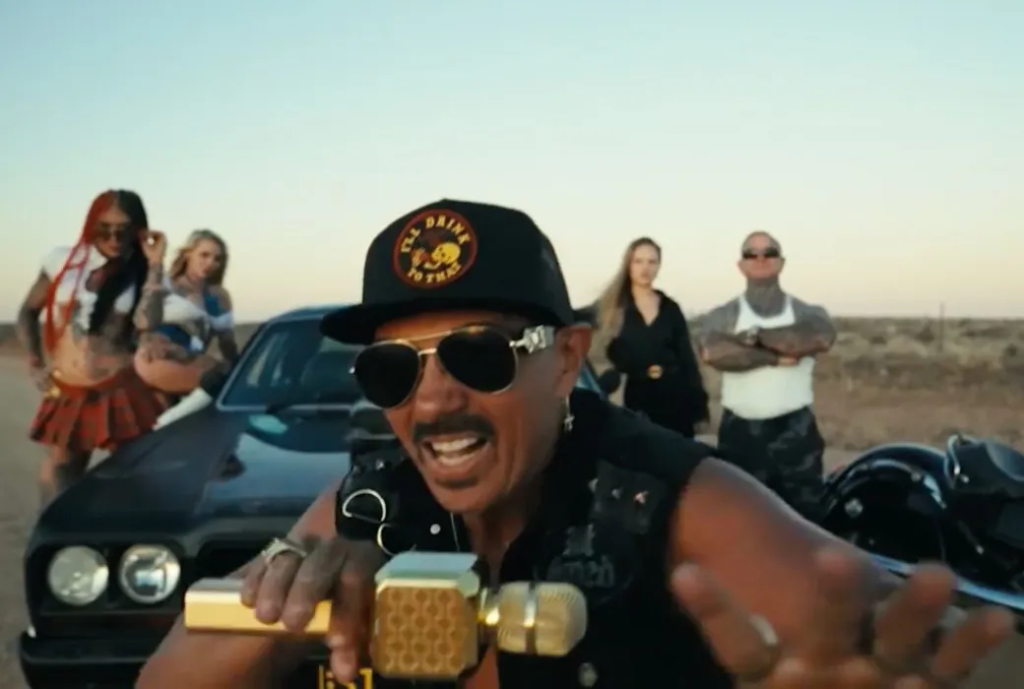Australian Tumbleweeds
Dead Heat for Deadloch
Press release time!
Prime Video Renews Global Hit Deadloch For Season Two
SYDNEY, Australia – July 9, 2024– Prime Video, Guesswork Television and OK Great Productions, with the support of Screen Queensland and Screen Territory, today announced that Amazon Original, Deadloch, has been renewed for a second season. From co-creators Kate McCartney and Kate McLennan, Season One of the award-winning crime comedy garnered widespread global success in 2023. Production on the 6-part second season will commence later this year and will be released globally on Prime Video.
Lauded by critics and legions of fans in Australia and around the world, Deadloch became a bona fide breakout hit, reaching the Top 10 TV Shows in more than 165 countries and territories on Prime Video including the U.S., UK, and Canada. The first season, set in Tasmania, saw two very different detectives thrown together to solve the murder of a man. The series won five AACTA Awards earlier this year including Best Acting in a Comedy for Kate Box and Best Screenplay in Television for Kate McCartney and Kate McLennan. The series recently scored three nominations in the 2024 TV WEEK Logie Awards including Best Scripted Comedy Program.
Season Two heads to the Top End of Australia and sees the return of Kate Box and Madeleine Sami as Dulcie Collins and Eddie Redcliffe. The detective duo are in Darwin investigating the death of Eddie’s former policing partner, Bushy, but when the bodies of two Top End icons are discovered in a remote town, they are flung into a new sweatier, stickier investigation. Also reprising their roles are Nina Oyama as Abby Matsuda and Alicia Gardiner as Cath York, Dulcie’s wife.
“We are thrilled that Deadloch will be returning for a second season to give our global Prime Video customers another dose of its unique blend of Australian humour and gripping mystery, this time set against the visually stunning Northern Territory landscape,” said Sarah Christie, senior development executive, Amazon MGM Studios. “The success of the first season, which has become a critical darling and cultivated a passionate fanbase, is a testament to the brilliant creative force of Kate McCartney and Kate McLennan. It’s wonderful to be continuing our collaboration with them, Guesswork Television and OK Great Productions, and to bring back our outstanding cast in Kate Box, Madeleine Sami, Nina Oyama and Alicia Gardiner. We can’t wait to share more from the world of Deadloch with fans around the world.”
“We are so excited to head to the Top End for a sticky, sweaty and filthy Season Two,” said Kate McCartney and Kate McLennan, creators, writers and executive producers. “Both of us are thrilled to be teaming up again with comedy angels Kate Box, Madeleine Sami, Nina Oyama and Alicia Gardiner and we can’t wait to work with a new bunch of cast members and some massive fucking crocodiles.”
“Smart, slyly satirical and flat out funny, Season Two picks up where season one left off,” said Kevin Whyte and Tanya Phegan, Executive Producers, Guesswork Television. “Once again Amazon MGM Studios and Prime Video have given us the opportunity to take the Kates’ story to every corner of the planet and our new partners Screen Territory and Screen Queensland have enabled us to leave the puffers behind and head north for the next instalment. We can’t wait to get back on location with this extraordinary team.”
“It’s fantastic that Deadloch’s second season will be made at Screen Queensland Studios, Brisbane as well as utilising our local waterways,” said Jacqui Feeney, CEO, Screen Queensland. “Screen Queensland is passionate about supporting Australian drama production and we look forward to welcoming the creative team behind this internationally acclaimed series to Brisbane.”
“Screen Territory is delighted to continue its production relationship with Prime Video and for the first time Guesswork Television in welcoming Deadloch Season Two to the Northern Territory.” said Jennie Hughes, Director of Screen Territory. “Kate McCartney and Kate McLennan are immensely talented creatives and we look forward to their unique and quirky take on the Northern Territory’s ‘Top End’ through the adventures of comedic detective duo Dulcie and Eddie. We are excited to support this terrific project which will deliver more opportunities for our local cast and crew and anticipate the production of a fantastic series for Deadloch fans with a unique Territorian twist.”
No big surprise there, though it took them long enough. Guess they had to find another state willing to cough up the funds (season three they’ll be heading to… the Gold Coast?) before the big announcement.
The real interest here’ll be how much comedy this retains, or whether it makes the (small) leap from “comedy take on a much loved genre” to “slightly quirky example of a much loved genre”. Sure, the first series did a pretty good job of balancing comedy with outrage, and it’s not like the Northern Territory is a less overtly blokey setting for what Wikipedia calls “a feminist noir comedy”. But commercial pressures do tend to flatten out the rough edges of a series as time goes by.
And that’s not even considering the real elephant in the room. Fingers crossed they can find a small town in the NT named Deadloch, otherwise they’ll be in real trouble.
Why dramedies suck with reference to Austin and Colin from Accounts
With dramedies seemingly the only scripted comedy genre that anyone in Australian television or streaming is prepared to make right now, we expect a lot of the relatively few which turn up. Sadly, what we get from shows like Austin and Colin from Accounts, are shows which feel written to a formula and contain few laughs.
Austin started off well in that it got a few decent laughs from the Australia/UK cultural clash, and from the almost affair between Ingrid (Sally Phillips) and hot barman Luke (Tai Hara). The titular character’s autism and how others reacted to it, also made for some good (sensitively handled) comedy.
But when the action moved to London, and tension between Austin (Michael Theo) and his estranged father Julian (Ben Miller) heated up, things became more serious. Right on cue, in the second-to-last episode, something big happened which could tear the family apart. Also, there was romance in the air. Light and shade, remember, are so important in this sort of soapy drama.
Colin from Accounts, on the other hand, decided to schedule its big dramatic moment, which could tear the family apart, for episode six. And, yes, just like Aftertaste before it, they killed off an arsehole old bloke character. Although, admittedly, this was an arsehole old bloke character we only got to know in that episode. This meant he had to be – and was – a 1,000,000% arsehole out of the blocks for us to react strongly to his death. And the actor John Howard played him brilliantly.
But don’t worry folks, the drama (not comedy) caused by this death, was balanced in episode eight by that other well-worn plot point of dramedies, a wedding with a twist (see also Rosehaven).
If you’ve been watching Austin and Colin from Accounts and wondering if there’s a tick list of plot points that Australian TV producers seem to want in dramedies, then you’re not alone. And assuming there is such a list, it would seem that “a sub-plot about someone getting cancelled” is also on it.
The notion of “someone being cancelled” is topical, of course, and prime clickbait, but based on Austin and Colin from Accounts, it doesn’t often translate into laughs or good drama. Part of the reason is that in both shows the man who got cancelled deserved it; you shouldn’t re-tweet Nazis (Julian in Austin) or hit on your students (Lee in Colin from Accounts). Also, while both men lost their jobs, they still live in big expensive houses and still have lots of money. So, why should we care? *
Colin from Accounts did have a go at delving deeper into the world of being cancelled, with an episode about Lynelle’s anti-cancellation action group “Women Against Women Against Men” but it was fairly unconvincing as a take on the backlash against cancellations. Even if it did make a strong statement about Boomers lacking younger generations’ understanding of the issue.
Overall, it’s easy to walk away from shows like Austin and Colin from Accounts disappointed. For every part of the show which is interesting or worthwhile, there are a dozen things which you’ve either seen before or could have been better done. That, and they’re not particularly funny.
* If you want a much more interesting, and far less formulaic, take on a well-off white man being cancelled, we suggest Douglas Is Cancelled, which recently aired on the UK’s ITV. It also includes some quite funny digs at the world of comedy and the line “sitcom is dead”. Which, sadly, is true.
There’s a reason people call them the Bogies
The Logie Award nominations for 2024 came out the other day and honestly, it’s hard to work up any feelings towards them. But we feel like that about many things related to Australian television and comedy these days.
The 2024 Logie Awards nominations are what you’d expect them to be after the last 12 months of television: some of the better or more interesting comedies get nominations, but it’s the comedy-adjacent shows and personalities who dominate. If you’ve got time, you could cast a vote for comedian-hosted shows like War on Waste, Lego Masters Australia, I’m A Celebrity…Get Me Out of Here!, Gruen or Hard Quiz; the latter two shows are even nominated in the Best Comedy Entertainment Program category.
Also up for Best Comedy Entertainment Program are programs that lean a bit more into the whole “comedy” thing, like Have You Been Paying Attention? or Thank God You’re Here. But given that the final two nominations for this award are The Weekly with Charlie Pickering and The Yearly with Charlie Pickering, we’re guessing the organisers have been quite liberal in their definition of “entertainment”.
Nominated for the Best Scripted Comedy Program category are Kate McLennan and Kate McCartney’s comedy noir murder mystery Deadloch, depressing post-suicide comedy/drama In Limbo, depressing revival Mother and Son, Population 11, a Stan comedy which The Guardian’s Luke Buckmaster described as “a letdown” (two stars), Strife, starring Asher Keddie, which various websites list as either a drama or a comedy/drama (don’t ask us, we haven’t seen it!), and the not brilliant fifth series of Utopia. Of the six, we’d give it to Deadloch, but given this a public-voted award, we’re guessing one of the three ABC shows will win purely because more voters are likely to have watched them.
As has been the case for a few years now, there are Silver Logies for Best Lead Actress and Actor in a Comedy. And the nominations are…
Best Lead Actress in a Comedy
- Celia Pacquola, Utopia
- Danielle Walker, Gold Diggers
- Denise Scott, Mother and Son
- Kate Box, Deadloch
- Kitty Flanagan, Utopia
- Madeleine Sami, Deadloch
Best Lead Actor in a Comedy
- Ben Feldman, Population 11
- Bob Morley, In Limbo
- Lincoln Younes, C*A*U*G*H*T
- Matt Okine, Mother and Son
- Rob Sitch, Utopia
- Ryan Corr, In Limbo
We like to think Lincoln Younes will take out Best Lead Actor, but has anyone apart from us actually seen C*A*U*G*H*T?
As for the Gold Logie, Andy Lee, host of The Hundred and Julia Morris, co-host of I’m A Celebrity… are nominated along with occasional guest on The Weekly… Tony Armstrong. On the plus side, Sam Pang is hosting again, so even if some questionable people come away with awards, there should be a few laughs throughout the ceremony.
Emu War (What is it Good For)
The Emu War is an Australian comedy movie and we’ll stop right there. To clarify: this is a comedy that’s (barely) movie length, not a movie that’s claiming to be a comedy. What’s the difference? Australian movies are almost always either scams to extract money from funding bodies or calling cards for the cast and director as they try to kick start a Hollywood career. Australian comedies? You remember those, surely.
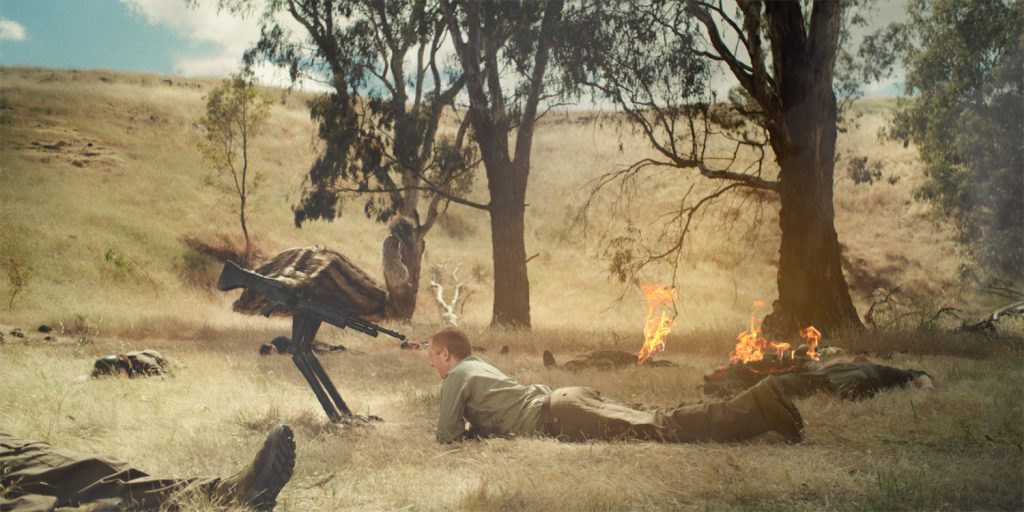
After appearing in selected cinemas for one weekend only (it has a proper distributor, so it’ll be online and on blu ray soon enough if you missed it), The Emu War is loosely based on a bunch of comedians making shit up. Sure, the basic concept – the Australian Army vs a bunch of Emus in 1932 – has some grounding in fact. But this film takes that starting point and just throws a bunch of crud on it, to coin a phrase.
After a massacre of Australian forces (including Luke McGregor, in a wordless cameo) due entirely to a vengeance-crazed Major Meredith (Damian Callinan) disregarding orders, he’s given a chance to redeem himself by leading an elite unit deep into enemy territory to assassinate the Emu Queen. Much stupidity ensues.
The most flattering comparison we can make is to early D-Gen material where a loose parody of a well-worn genre – in this case, war movies – is basically an excuse for a lot of shoddy “special effects” and silly jokes. As such, this largely gets the mix right: you won’t laugh at everything here, but you’ll probably laugh at something.
Another subplot involves an attempt to smuggle Australia’s “horniest man” into the Emu base. There he can root the Emu Queen to death (being extremely horny is her one weakness). The mission relies on the improv skills of a stand up comedian who might be able to do the impossible: impersonate an emu. Does this require her to wear a pissy costume? Of course.
There’s a few “historical” cameos thrown in. Ned Kelly is a stand up comedian, Burke & Wills are (extremely gay) conjoined twins. The Prime Minister is a pants-pissing Harold Holt. They’re one-joke appearances that don’t outstay their welcome. At barely over an hour, this (mostly) powers through the gags so the duds don’t get time to stink up the place.
Speaking of which, there’s a fair amount of gross-out comedy here. Many of the many, many deaths are extremely gory. Fortunately, none of the effects are remotely convincing so you’ll have no trouble sleeping afterwards… even if you did just see an entire emu village burnt to the ground with mothers and children inside.
The relentless drive to try anything for a laugh sells a lot of the shonkier material. In one scene an elite unit discovers they’ve been fitted with suicide cyanide teeth for a joke older than the Emu War itself. And yet, the fact they were willing to make such a hack joke is funnier than the joke itself. Even in Australian cinema, committing to the bit still pays off.
Mark Humphries’ satire is back
In news no one was expecting, including possibly Mark Humphries himself, Mark Humphries is back on TV doing satire. On Channel 7’s 6pm Sydney news bulletin, no less.
An article in The Australian gives further details on this but we’re too cheap to pay to read them, so here’s our thoughts on what we know about this story instead…
WHAT?!
No, seriously, what?! On Channel 7?!
Channel 7 doesn’t exactly have a fine tradition – or in fact, any tradition – of making satire. And given the closest it gets to making comedy these days is whatever Paul Fenech has thrown together recently, it’s not exactly the home of quality laughs either.
As for its news output, a typical 7 News bulletin focuses on the latest ram-raids, stabbings and servo hold-ups in your area. Want to know what’s going in Ukraine? Or how the government’s trying to tackle the climate crisis? Or the rental crisis? Er, try the ABC or SBS.
So, what is 7 News Sydney doing creating a satire slot? That doesn’t seem to fit with everything else they do or have ever done. Or indeed, anything Mark Humphries does or has ever done. Humphries’ satire on 7.30, and elsewhere, has tended to focus on political news and big issues. And isn’t a sketch about something that happened in Canberra going to look weird after a bulletin dominated by fear-mongering stories about African immigrants, and nonsense stories about how Boomers are coping with falling house prices?
A satire slot which takes the piss out of stories about sensationalist commercial news stories would be fun, but Channel 7 Sydney’s 6pm News bulletin seems an unlikely place for that to happen.
Or are we looking at this the wrong way? Perhaps the thinking goes like this: why should satire be focused on the stories that people who watch ABC News and read The Guardian care about? Isn’t it time for satire which comes from the perspective of people worried about local crime, immigrants, and house prices?
And yes, that perspective has been historically under-represented in satire, but why go to Mark Humphries to make it? A satirist whose recent work includes this video for the Climate Council.
Honestly, this whole thing sounds a bit weird. And are we sure it isn’t 1st April?
But given it’s June and this story is real, we’re intrigued to see how this pans out. And if it doesn’t, how quickly Humphries gets the arse.
Austin Powers
Austin is the kind of series you get when the production side of television couldn’t give a rat’s arse about whatever it is the audience actually wants to watch. And fair enough. The entire basis of ABC television is to provide programming for those who aren’t being served by mainstream broadcasting. But there’s a big difference between “television for people who the commercial networks ignore” and “jobs for the boys”. Austin? Lets hope the ABC got mates rates for this one.
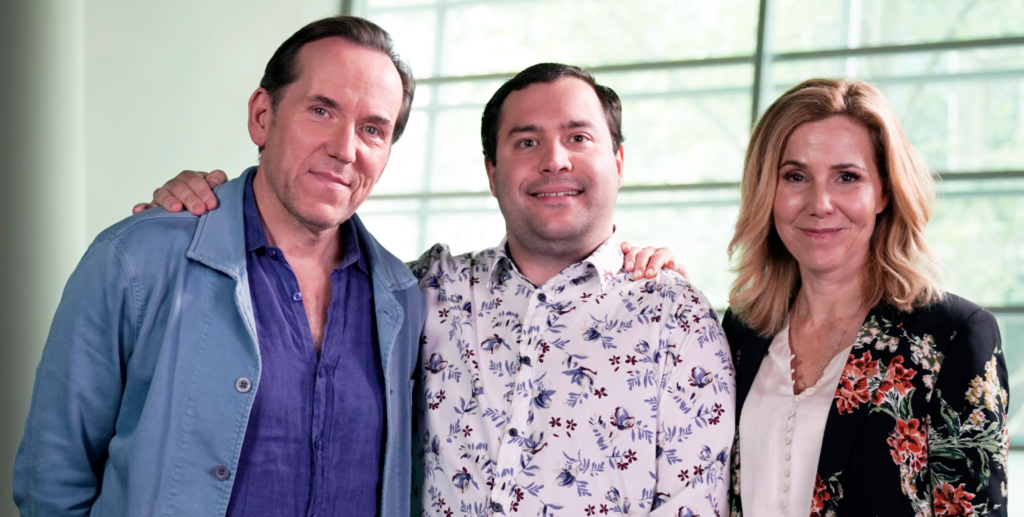
Like almost everything local that appears on the ABC, Austin is a television series the ABC and other Australian funding bodies have invested (heavily?) in. Good news for the local industry. What they haven’t considered is whether you, the viewer, might be getting anything out of the deal.
This isn’t so much a matter of being funny; these shows never really are. The ABC has only three scripted “comedy” series lined up this year: White Fever, Austin and season 3 of Fisk. Guess containing actual comedy is an optional extra for those comedy series the ABC decides to invest in.
So, not very funny*. It’s also not, in just about any way that counts, Australian. It’s a series about two British people who, while on a trip to Australia, discover that one of them most likely has an Australian son. Awkward. It’s a British comedy with British stars that’s partly set in Australia. So why are Australian funding bodies investing in it?
Oh right, Miller’s character’s secret son, the titular Austin (Michael Theo). The character is on the autism spectrum. So is Theo, making his major acting debut after two seasons of ABC dating show Love on the Spectrum. He’s not bad in this. He’s also very much the third wheel on a series headlined by UK comedy stars Ben Miller and Sally Phillips. They’re also not bad in this. They’re also not Australian, not exactly household names, and not much of a reason to tune in.
It’s possible to create a series that does a good job of mixing casts and locations. Surprisingly, NCIS: Sydney does an ok job of it. So does ABC crime series Troppo. The first features a largely US cast in a firmly Australian location where the cast are treated as outsiders. The second is an Australian series that just happens to have a US actor in one of the lead roles. Austin does neither of those things. It’s a 2024 version of an On The Buses movie where they go to Australia and discover one of the regulars has a secret son.
Austin at least is specifically set in Canberra. That puts it slightly ahead of similar projects where Australia is a stand-in for “somewhere in the Western world”. It’s a step up from, say, Spreadsheet. That featured pretty much the same mix of a UK lead, an Australian setting, and a suffocating blandness that could have come from anywhere. Oh look, the co-creator and director of Austin was also the co-creator of Spreadsheet, what a coincidence.
Hey, while we’re on the subject of international productions: why are they always set in Australia? Australia doesn’t seem to be making all that many series where some big name local actor goes overseas and has adventures. Oh right, because the entire Australian film and television industry is based around the idea that what’s important are local jobs, not making things locals want to watch. So long as a bunch of behind-the-camera crew get paid, who cares what’s up on the screen?
Which brings us back to Austin. It’s a perfectly competent series** that wouldn’t make it to air here without the local angle, and the local angle is so minor*** you could remove it without anyone noticing. But that’s par for the course with this kind of project, which almost always feels like the kind of thing an overseas network would never produce on their own but will happily put it to air so long as Australia covers a lot of the costs.
Hope you weren’t expecting them to spend that money on something you wanted to watch.
.
*it’s a series about a white middle-class man who gets #cancelled, a subject that is yet to deliver a single decent comedy after at least six years of trying
**One big problem comedy-wise is that for this set-up to be funny, Miller’s character really needs to be a right bastard – but as we all know that everything is leading towards him realising he really does love his son, there’s a hard limit on just how shitty he can be
***Theo is good, but he’s not irreplaceable
The (F)art Of…
ABC arts programming has been rubbish for years and new effort The Art Of… is no exception. Just how bad is it? It manages to make Josh Thomas seem good.
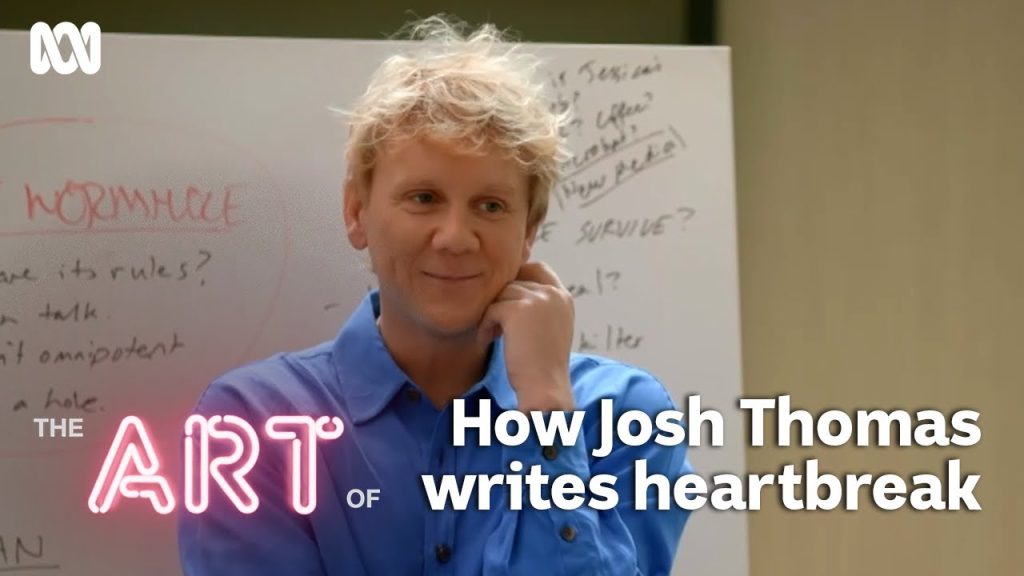
It doesn’t make him seem funny mind you because haha, they’ve got him on the episode about “heartbreak”. Why is a program about the arts doing an episode on heartbreak? Welcome to today’s ABC, where everything is about feels and personalities and the feels of personalities. For fuck’s sake, the other local shows on a Tuesday night are “Tony Robinson looks at things” and “Myf Warhurst has emotions”. Presumably “Sammy J pats cats” is on hold until 2025.
So yeah, the new ABC arts program is a show where the ABC invites a bunch of their mates on to talk about how feelings have inspired them to come on an ABC arts program. Remember when the ABC would air shows that actually reviewed books and films? The ABC sure hopes you don’t.
Obviously, Josh Thomas is here to remind the audience of the heartbreak they felt when they tuned into Please Like Me expecting it to be funny. Just kidding. Slightly more seriously, was Please Like Me an especially heartbreaking show? It had a rock-solid formula where the second-last episode each season featured a death / near-death so the final episode could be sombre. But so did that show about the cranky out-of-touch chef and his cool niece (Aftertaste – Ed) and that wasn’t exactly a classic of heartbreak. Or anything else.
While there’s a bunch of other people in this episode, none of them are technically comedians (though Clem Ford seems like someone who possibly gives lectures that get a lot of clapter?). Again, insert your own Josh Thomas joke here. Research reveals his appearance here is even more of a sick burn as there actually is an episode coming up about comedy (featuring amongst others, Shaun Micallef). Didn’t even make it into the funny episode, damn.
But in a twist, Thomas gets to make a bunch of reasonable and even occasionally interesting points. He explains that mining his own pain to inflict it on his viewers was tricky because (on the one hand obviously, but on the other nobody else seemed to mention it) heartbreak involves two people. Plus, in fictionalising his mother’s mental illness he was constantly aware that she’d be watching the show (also, she had script approval… and yet didn’t demand more jokes). And so on and so forth.
It’s not that Thomas says anything more than the usual weekend newspaper supplement interview platitudes. It’s that pretty much all of the rest of this arts show is so basic and stunted and bad at being interesting. Though if you haven’t been to Melbourne in a while (or ever), there are a shitload of pointless establishing shots of the CBD to enjoy. Arty!
We Need to Talk About Colin
Colin from Accounts is back, and right from the start there’s a problem. No, not that Gordon (Patrick Brammall) and Ashley (Harriet Dyer) have given Colin (a dog) away and want him back. That’s solved by the end of the first episode. And not dragging it out? Pretty much the opposite of a problem really.
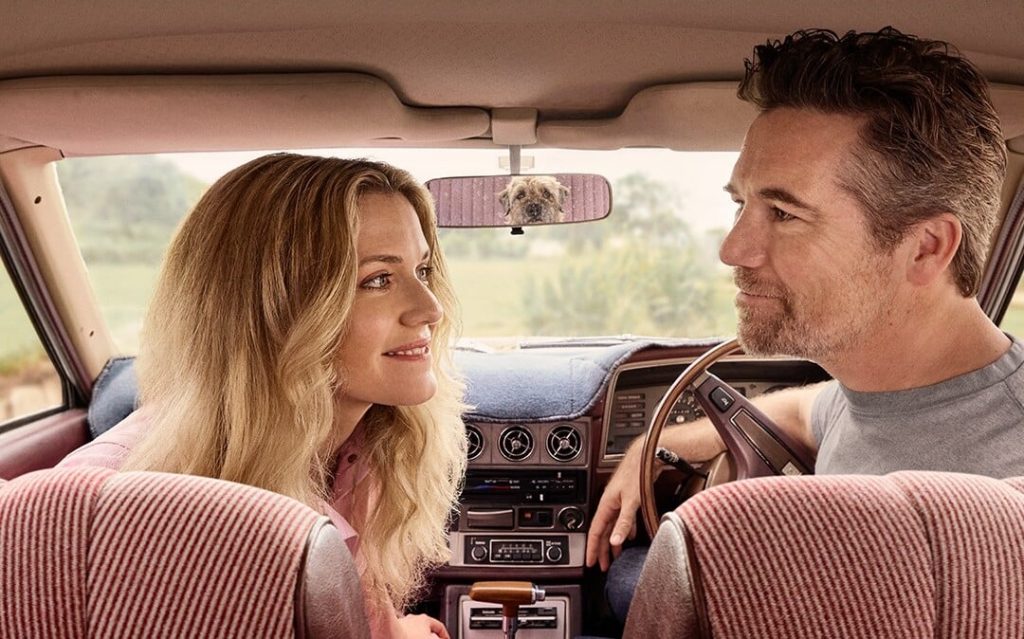
No, the problem is that Gordon and Ashley – going by this season’s first episode at least – aren’t funny. Well, technically, aren’t funny anymore. We were never big fans of this rom-com (hold the com), but back in season one it was clear that both Gordon and Ashley (especially Ashley) were meant to be comedy characters.
Not any more. Now they’re just a kind of boring, “we’ve both got issues”, couple who think they’re in love but mostly act like they’re scanning the room for exits. And this situation – which on another show could still generate laughs – is pretty much played straight down the line. So we’re meant to be worried they won’t work it out? As the saying goes, don’t try to threaten us with a good time.
Basically, the writers – oh look, it’s Brammall and Dyer, no wonder a lot of their dialogue reads like they just transcribed a real conversation and hoped it was quirky – have bought into the idea that this is a serious relationship show. So it’s not even trying to be funny? Well… not exactly.
If you watch the first episode of season 2 of Colin From Accounts, one thing that stands out is that pretty much every single person Gordon and Ashley interact with is a comedy dickhead. Because the two leads are no longer funny, now everyone else has to be. Or at least, everyone else has to be weirdly aggressive and argumentative in order to create something to make this episode more than just “two sad sacks mope around”.
This isn’t exactly a break from what’s gone before. The first season took a fairly swift turn away from comedy around the halfway mark and by the end was basically a relationship drama with occasional swears. Will we get the same dynamic this season? Look, if Colin doesn’t shuffle off this mortal coil at the end of episode seven, we’ll owe our bookie slightly more than we’re comfortable with.
But it does leave this season as something of a comedy donut – you know, empty in the middle. This season might start off with yet another comedy road accident, but our leads have changed. They’ve matured. Now they’re just two grown-ups slightly worried about the direction of their relationship. And we can get that kind of angst from our mates.
Only we don’t, because our mates aren’t boring dickheads we actively avoid.
Superwog Characters Described as “Iconic”, Antics Still Considered “Usual”
Press release time!
Theo and Nathan Saidden will bring back their iconic Superwog characters for a new standalone series, Son of a Donkey. The Saiddens will write, direct, produce and star in the series also produced by Princess Pictures for Netflix.
In Son of a Donkey, we meet Theo just as he moves out of his home to claim his independence — until he’s faced with the harsh realities of adulthood. From driving fines and daddy issues to internet scams and a lot of therapy, Theo and his best friend Johnny get up to their usual antics as they come to terms with what’s most important: family.
Production has started and filming will take place on-location in Melbourne. The series is supported by VicScreen through the Victorian Screen Incentive (VSI).
The Australian brothers have amassed over 3.4 million YouTube subscribers and 476 million video views on their worldwide popular channel. This success led to the creation of the Superwog television series, which has enjoyed two successful seasons on ABC iView. Following its run, both seasons, named Superbro outside of Australia, streamed on Netflix worldwide, staying two weeks on the Australia and New Zealand weekly Top 10 lists.
Theo and Nathan Saidden say, “We’re so happy to announce our new show with Netflix. This will be the wildest show we’ve ever made. There’s new characters, bigger ideas, more action, more craziness. It’s just so exciting to be working with a service that puts us on screens all around the world.”
Mike Cowap, Executive Producer for Princess Pictures says,”We’ve been proud to support Theo and Nathan on their evolution from short online comedy to half hour episodes and now to the most ambitious season-spanning epic story to date. All shot through with their larger-than-life characters and trademark irreverent, slapstick humour. They’ve already earned a passionate fan base outside of Australia, but with their first Netflix series we’re excited to see that grow exponentially.”
Que Minh Luu, Director of Content ANZ, says, “Son of a Donkey is a heady mix of absurd satire, laughs and profanity that delivers a uniquely Australian type of show we can’t wait to bring to Netflix audiences everywhere. It’s a pleasure to collaborate with Theo, Nathan and the team at Princess Pictures who take making comedy extremely seriously, and with enormous pride in writing these fan-favourite characters.,
Caroline Pitcher, VicScreen CEO, says, “We’re thrilled to support Theo and Nathan Saidden in bringing their unique brand of humour to a global audience with their new series, Son of a Donkey, supported through VicScreen’s Victorian Screen Incentive. This new series will continue to engage Victorian talent, creating 215 jobs and is set to inject over $5.5m into Victoria’s economy. We can’t wait for audiences around the world to experience this exciting new show.”
The six-episode standalone series will stream globally on Netflix and joins the platform’s growing slate of homegrown Australian films and shows on Netflix including recently released Heartbreak High Season 2, Boy Swallows Universe, Run Rabbit Run, Surviving Summer, ONEFOUR: Against All Odds, Love is in the Air and more.
Uh… hurrah? Good to see Netflix is still picking up Aussie comedy… in stark contrast to pretty much every local broadcaster you might care to name.
The Outback Outlaw Pauly Fenech
Pauly Fenech is back (when is he not?) with a new series, Outback Outlaw Comedian (7Mate/7Plus), in which he tours the country with his live show. But in case you’re worried that this is going to be a bog-standard documentary about life on the road, don’t worry. There’s way more going on here. This is a show about one man fighting the scourge of political correctness and making comedy for real Australians.
“THE WOKE MOVEMENT HAS KILLED AUSSIE LARRIKIN COMEDY” the show declares upfront. “FORCED OUT OF CAPITAL CITIES ONLY ONE COMEDIAN REMAINS.”
And so, accompanied by bodyguard and former Mr Universe Lee Priest, dancers and Only Fans content creators Tayla and Sam, and tour manager Leah, Fenech drives from town to town, putting on shows in pubs and hanging out with the locals.
But if you’re curious about what’s in Fenech’s live show, too bad, you’ll have to pay to see it. The bits where he presumably does some kind of stand-up aren’t part of Outback Outlaw Comedian. All we get to see in this show are the bits where Tayla and Sam get their gear off and get “thonged”.
Thongs, and people getting hit with them, have long been a part of Fenech’s schtick. He even has a rainbow thong, for thonging members of the LGBTQIA+ community. So, once Tayla and Sam have been slapped on the arse with thongs multiple times – and who knows, maybe this is the funniest part of the show and not just some gratuitous violence and nudity – it’s the turn of the audience to get up on stage and cop one.
In case you’re wondering, men get thonged in the face while women have to bend over and bear their arse to take their thonging. Fenech explains that this is because he could never thong a woman in the face. Or hit a man on the arse. These are his standards.
Why people line up to get thonged by Fenech is unclear. Possibly there’s some set-up in his stand-up act which makes getting hit with a thong sound fun? Either way, lots of people do it. And not all of them are blind drunk.
Cut to after the show, where Fenech likes to wind down from whatever his act actually is by having a few drinks and partying with his outback mates. There’s metal music, people doing burnouts in their Valiants, and a turn from yet another “dancer”. But, hey, back off inner city, latte-sipping, politically correct types, this is the real Australia having fun their way!
Meanwhile, back on the road, there’s an attempt to make Outback Outlaw Comedian more of a documentary-drama, when the car in which Leah, Lee, Tayla and Sam are travelling gets a flat tyre. Leah, as tour manager, has to fix the problem, but it takes her ages, and they arrive late at the next venue. Oh no! What will they do?
Introducing some other characters or having some kind of plot or peril in this series would certainly make it more interesting than footage of Fenech hitting people with thongs and getting pissed. But plots and storylines have never been Fenech’s strong points. His key skill is getting shows on TV multiple times a year. And Outback Outlaw Comedian is presumably a way for Fenech to make some easy TV, and a bit more money, out of his live tour, by just…filming his live tour.
Except we don’t really get Fenech’s live tour; we don’t see his stand-up and there’s no real insight into what happens behind the scenes. We don’t even get much about how Fenech’s standing up to the woke brigade. We just get tits and thongs and arses. For 30 minutes including ads.
And after all that, the real arse is you for having watched it all.

